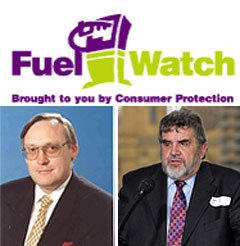Make / Model Search
News - General News - FuelsAuto clubs at loggerheadsDebate: NRMA supports FuelWatch, while the RACV, RAA and RACQ say it will spell the end of "cheap Tuesday". NRMA and RACV split over the worth of federal government's new FuelWatch scheme18 Apr 2008 AUSTRALIA’S major motoring clubs are at odds over whether the federal government’s new National FuelWatch Scheme will achieve its aim of delivering cheaper petrol prices to motorists. While the NRMA supports the new scheme, the RACV – supported by the RAA and RACQ – said it would deny motorists the opportunity of taking advantage of the predictable weekly discounting pattern that has resulted in the so-called “cheap Tuesday” in the eastern states. The dispute between the two bodies has taken on an edge, with NRMA president Alan Evans saying that the RACV was wrong “again” and that motorists would save as much as five cents a litre under the scheme. “The RACV has got it wrong,” Mr Evans told the Nine Network. “We’re pretty sure of our facts. We’re really keen to see a FuelWatch on a national basis because we think it will benefit (motorists).”  The RACV's David Cummings (left) and Alan Evans from the NRMA. Announcing the system last week, Prime Minister Kevin Rudd said it would result in average savings of at least two cents a litre, based on experience with a similar scheme introduced in Western Australia in 2001. The RACV's David Cummings (left) and Alan Evans from the NRMA. Announcing the system last week, Prime Minister Kevin Rudd said it would result in average savings of at least two cents a litre, based on experience with a similar scheme introduced in Western Australia in 2001.The scheme – which requires petrol stations to lock in each day’s prices by 2pm the previous day – will commence nationally from December 15 this year. Assistant treasurer Chris Bowen said the scheme was a response to the December 2007 report on fuel prices by the Australian Competition and Consumer Commission (ACCC) and would cost the government $20.9 million over four years. Consumers will be able to check the following day’s prices of petrol, diesel and LPG on a website, through a toll-free phone number or with email or SMS alerts for their suburb. Mr Bowen told the ABC that the WA scheme had “delivered real benefits to motorists”. “There will always be cheaper days to buy petrol,” Mr Bowen said. “The evidence from Western Australia is that there is still a petrol cycle. It lasts longer and is not as volatile.” ACCC chairman Graeme Samuel said that the WA experience showed a decrease of between one and two cents a litre, but RACV spokesman David Cumming has contradicted this claim. “All the available evidence shows that Perth motorists pay on average two cents more per litre than Victorians do, and we do not believe it would be a good scheme to introduce into this state,” said Mr Cumming. “While the (WA) system levels out the highs and lows in the petrol price cycle, it has also produced a two-week price cycle that rarely results in the low fuel prices prevalent in Melbourne early each week. “Many people have talked up this system, but no one has yet provided any evidence that motorists in WA are better off than those in the eastern states.” The RACV was supported in its stand by the RAA in South Australia and the RACQ in Queensland. RACQ spokesman Gary Fites said that “the only certainty being offered to motorists is more uncertainty”. “The federal government has not acceded to requests... to provide independent evidence that the (WA) scheme actually led to lower pump prices,” Mr Fites said. “I guess, like every other Australian, we will just have to wait and see, but RACQ fears it could prove an expensive exercise for many motorists. “Here in south-east Queensland, motorists know that Mondays and Tuesdays are the cheapest days in the weekly cycle – to the extent that around two-thirds of total petrol volumes are sold on those two days. “Under this new scheme, there is a real risk ‘cheap Tuesday’ may no longer exist because that’s what has happened in Perth. “It’s hard to see how, by forcing retailers to fix their prices for 24 hours a day ahead, consumers will be better off or competition would be fiercer.” The Australian Automobile Association has published a survey that shows that the vast majority of motorists are aware of weekly pricing trends and 71 per cent nominated Tuesday as the cheapest day. “Lower prices on Tuesdays, coupled with high volumes, is a simple equation that translates to working families being able to save money each year by taking advantage of the existing, predictable price cycles,” said AAA executive director Mike Harris. But the NRMA’s Alan Evans said that motorists would welcome the certainty of knowing how much petrol will cost the next day. “They wouldn’t get caught out by sudden hikes like we’ve seen in Sydney and Melbourne of up to 20 cents a litre in a matter of minutes,” said Mr Evans. “And certainly, in the whole, it brings the average price down.” Opposition shadow minister Luke Hartsuyker questioned whether the prime minister has the full support of his own department for the scheme and described Mr Evans as a “Labor stooge”. |
Click to shareGeneral News articlesResearch General News Motor industry news |









Facebook Twitter Instagram